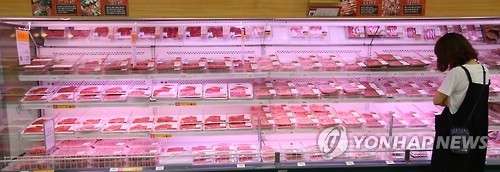
The volume of imported beef from the US hiked 47 percent on-year, between January and October this year, poised to take over the Korean market due to its cheaper selling price, government data showed Sunday.
According to data by Korea Customs Service and the US Meat Export Federation, the total volume of import beef rose 28.4 percent year-on-year, totaling 320,219 tons, in the cited period.
Among imported beef, that from the US made up 131,466 tons, up 47.6 percent on-year, while imports from Australia increased 14.9 percent.
“Due to the anti-graft law, there has been an increase in demand for import beef, because it is cheaper than Korean beef,” said an official of Nonghyup, a National Agricultural Cooperative Federation.
The anti-graft law, dubbed the Kim Young-ran law and which took effect on Sept. 28, restricts civil agencies, private educational institutions and media from giving and receiving free meals worth 30,000 won ($25.60) or higher.
A change in public sentiment toward US beef also backed the increase in imports.
According to a survey conducted by local pollster Gallup Korea and the US Meat Export Federation, 44.7 percent of surveyed people said they believed it is safe to consume US beef.
Millions of Koreans took to the streets urging the government to ban imports of US beef in 2008 over concerns of mad cow disease caused by US beef that could infect humans.
Meanwhile, the portion of Australian beef in Korea stood at 50.8 percent this year, down 6 percent from last year, while the ratio of US beef increased 5.4 percent to make up 41.1 percent of the market.
According to the Korean office of US Meat Export Federation, last year, US beef was at least 30 percent more expensive than import beef from Australia, due to pricey feeds as a result of drought in the US. This year, however, the price of US beef has stabilized while Australia faces a drought, so if the trend continues the ratio of US beef is expected to surpass Australian beef.
As import beef increases, the self-sufficiency rate of Korean beef continues to decline.
State-run agricultural cooperative Nonghyup predicts, the self-sufficiency rate of domestic beef will drop to the 30 percent range this year, compared to last year’s rate of 46.2 percent.
By Kim Bo-gyung (lisakim425@heraldcorp.com)
-
Articles by Korea Herald




![[Herald Interview] 'Amid aging population, Korea to invite more young professionals from overseas'](http://res.heraldm.com/phpwas/restmb_idxmake.php?idx=644&simg=/content/image/2024/04/24/20240424050844_0.jpg&u=20240424200058)







![[Hello India] Hyundai Motor vows to boost 'clean mobility' in India](http://res.heraldm.com/phpwas/restmb_idxmake.php?idx=644&simg=/content/image/2024/04/25/20240425050672_0.jpg&u=)






![[Today’s K-pop] NewJeans' single teasers release amid intrigue](http://res.heraldm.com/phpwas/restmb_idxmake.php?idx=642&simg=/content/image/2024/04/26/20240426050575_0.jpg&u=)